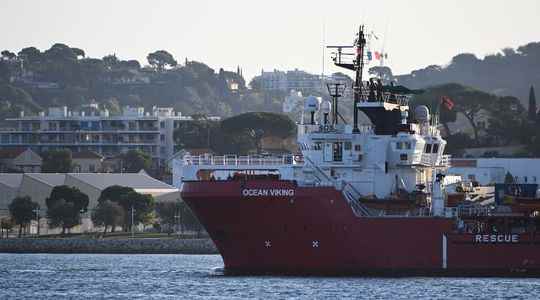“We are very relieved by the outcome even if this solution has a bitter taste”. Sophie Beau, co-founder of SOS Méditerranée, summarized, this Friday, November 11, the state of mind in which the NGO finds itself, after the French government agreed to land on its soil the 234 migrants present on board the ship. ocean viking. The latter, saved from certain death three weeks earlier, were refused any aid from Italy, despite being summoned by international maritime law to take charge of them.
France has therefore “taken its responsibilities”, in the words of the Minister of the Interior, Gerald Darmanin, and made up for Rome’s failed duty, not without deep bitterness. Former lifeguard on theAquarius, a ship that had rescued 630 migrants in the summer of 2018, and author of the Aquarius logbook. In the shoes of a lifeguard (Kero editions, 2021), Antoine Laurent notes that the political discourse hostile to foreigners prevents any effective coordinated action within the European Union.
L’Express: Already in 2018, Italy had refused to welcome an SOS Méditerranée boat, theAquarius. The situation of theOcean Viking, four years later, is it comparable?
Anthony Lawrence : There are of course similarities, but also some important differences to point out. In 2018, the Italian Coast Guard got involved in the migrant rescue operation. And if Matteo Salvini had been intransigent when it came to welcoming the 630 people on board – 400 more than on theocean viking – two Italian military ships had accompanied the Aquarius to Valencia, Spain. This had made it possible to distribute the people on the three boats, and thus to ensure their safety.
But in recent years, Italy has shown itself to be more and more intransigent. It is no longer involved at all and leaves the NGOs to manage distress situations at sea on their own. The diplomatic imbroglio between Paris and Rome had also been less important because Spain had quickly come forward to welcome the ship. This had made it possible to avoid a rise in tensions.
It seems that there is a particular Franco-Italian confrontation on the question of the reception of migrants. Is this really the case?
Yes, Italy is using France to offload responsibility for receiving migrants. She challenges us, taking advantage of the fact that we are also a Mediterranean country. Above all, through France, Italy intends to send a message to the European Union: “Do not leave us alone in the face of the influx of migrants”. This attitude may be understandable, but it is also in bad faith, because the European Union has adopted measures in recent years to help Italy. Behind this attitude, there is the implementation of an extreme right agenda which quite simply intends to stop the arrival of migrants on its soil.
Why can’t the European Union agree on a cooperation agreement?
When it comes to welcoming migrants, there is no unity. With l’Aquarius in 2018 and theocean viking Currently, the fate of hundreds of people is highlighted, but the real question is how to deal with the tens of thousands of migrants arriving in Italy, Greece or Spain. Today, there is no coordinated distribution mechanism within the European Union. Largely because anti-migrant discourse is dominant within European governments. To agree, it would take political voluntarism, but this does not exist. I say among governments, not among European populations. There is a will to help on the part of the citizens which is stifled by the posture of the leaders.
The migration policy implemented by the States is a response to the discourse of the extreme right, which believes that the harsher the reception policy, the fewer migrants will try their luck. My experience within SOS Méditerranée tends to make me think that this analysis is erroneous. Indeed, people who wish to join Europe do so out of obligation. Moreover, by making the borders of the European Union unsafe for migrants, governments push them to use illegal channels and indirectly support criminal human trafficking networks. While they should be allowed to find refuge through safe and legal migration channels.
France’s decision to host theocean viking has, precisely, aroused the indignation of the far right, who denounced the “laxity” of the government…
In 2018, the French government sided with those who criticized NGOs as false humanists and accomplices of smugglers. This time, circumstances somehow force the government to be on the side of the “humanists”. The cleavage being placed on the right of the Republicans, the Minister of the Interior, Gérald Darmanin, had to opt for the choice of aid. He expressed his support for the work of NGOs and agreed to welcome the ship on French soil.
But, at the same time, he announced that all those on board “not covered by asylum will be subject to removal procedures”, or that controls at the Franco-Italian border would be reinforced. He tries to reassure the right-wing parties, by making them understand that this decision is imposed by the circumstances.
